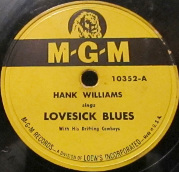Related Research Articles
"I'm So Lonesome I Could Cry" is a song written and recorded by American country music singer-songwriter Hank Williams in 1949. The song has been covered by a wide range of musicians.

"Lovesick Blues" is a Tin Pan Alley song, composed by Cliff Friend, with lyrics by Irving Mills. It first appeared in the 1922 musical "Oh, Ernest", and was recorded that year by Elsie Clark and Jack Shea. Emmett Miller recorded it in 1925 and 1928, followed by country music singer Rex Griffin in 1939. The recordings by Griffin and Miller inspired Hank Williams to perform the song during his first appearances on the Louisiana Hayride radio show in 1948. Receiving an enthusiastic reception from the audience, Williams decided to record his own version despite initial push back from his producer Fred Rose and his band.
"Take These Chains from My Heart" is a song by Hank Williams. It was written by Fred Rose and Hy Heath and was recorded at Williams' final recording session on September 23, 1952, in Nashville. The song has been widely praised; Williams' biographer Colin Escott deems it "perhaps the best song [Rose] ever presented to Hank...It was one of the very few songs that sounded somewhat similar to a Hank Williams song." Williams is backed by Tommy Jackson (fiddle), Don Helms, Chet Atkins, Jack Shook, and Floyd "Lightnin'" Chance (bass). In the wake of Williams' death on New Year's Day, 1953, the song shot to No. 1, his final chart-topping hit for MGM Records. Like "Your Cheatin' Heart," the song's theme of despair, so vividly articulated by Williams' typically impassioned singing, reinforced the image of Hank as a tortured, mythic figure.
"You Win Again" is a 1952 song by Hank Williams. In style, the song is a blues ballad and deals with the singer's despair with his partner. The song has been widely covered, including versions by Ray Charles, Jerry Lee Lewis, Roy Orbison, the Grateful Dead, Charley Pride, Bob Dylan, and the Rolling Stones.
"Honky Tonkin'" is a 1947 country music song, written and recorded by Hank Williams. His song went to #14 on the Billboard country music chart in 1948. In 1982, it became the sixth chart topping single for Williams' son, Hank Williams Jr.
"Men with Broken Hearts" is a song written and recorded by Hank Williams under the pseudonym "Luke the Drifter." It was released on MGM Records in 1951.
"My Bucket's Got a Hole in It" is a song widely attributed to Clarence Williams, who obtained a copyright in 1933, although the melody was recorded under various names years earlier. The song became popular performed by Hank Williams for MGM and reached number 4 on the country chart in 1949.

Hank Williams Sings is the debut album by American country music singer-songwriter Hank Williams. It was released by MGM Records on November 9, 1951.

"I'm a Long Gone Daddy" is a country song written and recorded by Hank Williams. It was released in 1948 on MGM Records and became his second top ten hit.

"I Can't Help It (If I'm Still in Love with You)" is a song written and originally recorded by Hank Williams on MGM Records. It hit number two on the Billboard country singles chart in 1951. In his autobiography, George Jones printed the first six lines of the song and stated, "Its lyrics couldn't be more simple - or profound."
"My Heart Would Know" is a song written and recorded by Hank Williams. It was released as the B-side to "Hey Good Lookin'" in June 1951 on MGM Records.
"Wedding Bells" is a song written by Claude Boone and recorded by Hank Williams on MGM Records. It peaked at No. 2 on the Best Selling Retail Folk chart in 1949.
"Settin' the Woods on Fire" was the A-side of a single by Hank Williams, released in September 1952. The song reached number 2 on U.S. Billboard Most Played by Jockeys chart and number 2 on the National Best Sellers chart.
On the Banks of the Old Ponchartrain is a song written by Hank Williams and Ramona Vincent. It was the singer's second single on MGM Records, released in September 1947.
"A Mansion on the Hill" is a song written by Hank Williams and Fred Rose and originally recorded by Williams on MGM Records. It peaked at No. 12 on the Most Played Jukebox Folk Records chart in March 1949.
"I Just Don't Like This Kind of Living" is a song written by Hank Williams and released as his thirteenth single on MGM Records in January 1950. The song peaked at #5 on the Best Selling Retail Folk Records chart.
"The Blues Come Around" is a song written and recorded by Hank Williams for MGM Records. It was released as the B-side to the single "I'm a Long Gone Daddy" in June 1948. It was recorded at Castle Studio in Nashville with Fred Rose producing and backing from Jerry Byrd, Robert "Chubby" Wise (fiddle), Zeke Turner, probably Louis Innis (bass) and either Owen Bradley or Rose on piano. Waylon Jennings recorded the song for his 1992 album Ol' Waylon Sings Ol' Hank.
"Moanin' the Blues" is a song by Hank Williams. It became his fourth number one single on MGM Records in 1950.
"I'm Sorry for You, My Friend" is a song written and recorded by Hank Williams. It was released as the flipside to his single "Honky Tonk Blues" in 1952 on MGM Records.

Moanin' the Blues is the second album by American country musician Hank Williams, released on MGM Records in 1952.
References
- ↑ Escott 2004, p. 329.
- 1 2 Escott 2004, p. 71.